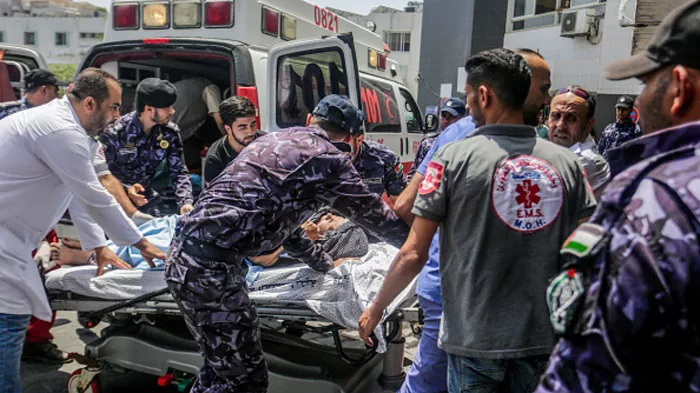During a recent briefing in Geneva, the Director-General of the World Health Organization (WHO), Tedros Adhanom Ghebreyesus, underscored the escalating health risks faced by Gazans due to ongoing Israeli evacuation orders. The situation has severely impacted medical facilities like the Al-Ahli and Patient Friendly Hospitals in northern Gaza, forcing closures amidst nearby conflict.
Tedros reported that the Indonesian Hospital, now operating at triple its capacity, has accommodated patients evacuated from Al-Ahli Hospital. However, over 10,000 patients urgently require evacuation for treatments unavailable within Gaza. Tedros stressed the critical need for multiple evacuation corridors to the West Bank, Egypt, and Jordan to address this medical crisis.
In addition to medical challenges, Gaza’s population faces acute food insecurity, with nearly one in four individuals at risk of starvation. The enclave is receiving minimal supplies, with only five WHO trucks permitted entry last week. Tedros highlighted a significant backlog of aid at border crossings, including 34 trucks at El Arish crossing and 40 trucks at Ismailiya in Egypt, awaiting clearance.
The WHO Director for the Eastern Mediterranean region, Dr. Hanan Balkhy, echoed Tedros’s concerns during her 11-day visit to occupied Palestinian territories. She described Gaza as facing dire conditions with compromised health and humanitarian operations due to fuel shortages. The streets are strewn with sewage and garbage, fostering a breeding ground for diseases such as acute watery diarrhea and respiratory infections.
Dr. Balkhy emphasized the breakdown of law and order exacerbating Gaza’s plight, posing severe risks not only to aid workers but to the entire population. The volatile situation hampers efforts to manage health crises effectively and increases vulnerability to gender-based violence among displaced Palestinians.
Despite WHO’s efforts to bolster medical supplies, logistical challenges persist, hindering aid delivery to hospitals in urgent need. Dr. Balkhy stressed the imperative of opening borders, including Rafah border, to facilitate the flow of fuel, medical supplies, and essential humanitarian aid into Gaza. She urged Member States to expedite diplomatic efforts for an immediate truce to alleviate the humanitarian crisis.
During her visit to the West Bank, Dr. Balkhy observed a deteriorating health situation exacerbated by ongoing attacks. She visited Jenin General Hospital and UNRWA clinics, witnessing firsthand the damage to infrastructure and medical equipment from repeated assaults. In response, WHO and partners have established mobile medical services to reach injured populations despite access challenges.
Dr. Balkhy emphasized the urgent need to reinforce fragile health systems in neighboring Jordan, Lebanon, and Syria, particularly amid escalating violence along the Lebanon-Israel border. She underscored that addressing political roots of these emergencies is essential not only for humanitarian relief but also for regional stability and security.
As Gaza’s health crisis intensifies, the WHO continues to advocate for immediate international action to mitigate suffering and support healthcare across the region.
Related topics:
- The Limits of an AI Health Coach in Tackling Chronic Diseases
- UN Agencies Call for Enhanced Global Access to Sexual and Reproductive Health Services
- WHO Enhances Health Care Access in Underserved Afghan Provinces


